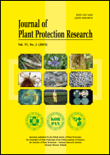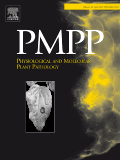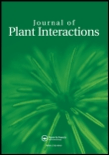
PHYTOPATHOLOGY
Scope & Guideline
Empowering researchers to combat plant diseases.
Introduction
Aims and Scopes
- Plant Disease Management:
Research dedicated to understanding and developing methods for managing plant diseases, including the use of fungicides, biological control agents, and integrated pest management strategies. - Molecular and Genomic Studies:
Studies focusing on the molecular mechanisms underlying plant-pathogen interactions, including genomic analyses, gene mapping, and the identification of resistance genes. - Ecological and Environmental Interactions:
Research exploring the ecological aspects of plant diseases, such as the role of environmental factors in disease outbreaks, pathogen spread, and the impact of agricultural practices. - Pathogen Biology:
Investigations into the biology and life cycles of plant pathogens, including their genetic diversity, virulence factors, and mechanisms of infection. - Innovative Detection Methods:
Development and evaluation of novel diagnostic tools and techniques for the rapid detection and identification of plant pathogens. - Plant-Microbe Interactions:
Exploration of interactions between plants and their associated microbial communities, including beneficial microbes and pathogens.
Trending and Emerging
- Genomic and Molecular Approaches:
There is a growing emphasis on genomic techniques and molecular biology to understand plant-pathogen interactions, including the use of CRISPR technology and high-throughput sequencing for pathogen detection and characterization. - Sustainable and Integrated Disease Management:
Research focusing on sustainable practices, including the integration of biocontrol agents, cover crops, and reduced chemical inputs, is increasingly prominent as the agricultural community shifts towards more eco-friendly practices. - Impact of Climate Change on Plant Diseases:
Studies examining the effects of climate change on plant disease dynamics, pathogen spread, and crop resilience are gaining traction, highlighting the need for adaptive management strategies. - Microbiome and Plant Health:
Research into the plant microbiome and its role in disease resistance and plant health is emerging as a critical area, with studies exploring how beneficial microbes can enhance plant resilience. - Remote Sensing and Digital Agriculture:
The utilization of digital technologies, including remote sensing and machine learning, for monitoring plant health and disease outbreaks is on the rise, reflecting advancements in agricultural technology.
Declining or Waning
- Traditional Chemical Control Strategies:
There has been a noticeable decrease in studies focused solely on chemical control methods for plant diseases, as researchers increasingly emphasize integrated approaches that include biological control and sustainable practices. - Classic Pathogen Characterization:
Research focused solely on the basic characterization of pathogens without linking them to broader ecological impacts or resistance mechanisms has become less frequent, as the field moves towards more integrative studies. - Single-Species Studies:
The focus on individual plant-pathogen interactions is waning, with more studies adopting a multi-species or community-level perspective to understand the complexities of plant health. - Geographical Limitations in Research:
Research that is geographically limited to specific regions without considering global trends or implications is less prevalent, as the journal promotes studies with broader relevance. - Historical Disease Studies:
While historical perspectives are valuable, the frequency of papers focused solely on historical disease outbreaks without contemporary relevance appears to be decreasing.
Similar Journals

Tropical Plant Pathology
Fostering dialogue for a sustainable agricultural future.Tropical Plant Pathology, published by Springer, is a leading journal in the fields of Agronomy and Crop Science as well as Plant Science, as evidenced by its impressive position in the Q2 quartile rankings for 2023. This esteemed journal, with an ISSN of 1983-2052, focuses on the intricacies of plant diseases and their management, showcasing significant research that addresses challenges faced by agronomists and plant scientists, particularly in tropical environments. With a Scopus ranking of 147th in Plant Science and 116th in Agronomy and Crop Science, it is recognized for its contribution to the advancement of knowledge in these areas, which is crucial for food security and sustainable agriculture. The journal operates under a model that facilitates researchers and professionals in disseminating their work effectively, fostering an ongoing dialogue among scholars dedicated to enhancing crop health and productivity. Discover more about groundbreaking studies in plant pathology that shape the future of agriculture!

JOURNAL OF PLANT PROTECTION RESEARCH
Bridging science and practice for a healthier planet.JOURNAL OF PLANT PROTECTION RESEARCH is a pivotal publication in the realm of agricultural sciences, dedicated to advancing our understanding of plant protection and pest management. Published by the INST OCHRONY ROSLIN, PANSTWOWY INST BADAWCZY in Poland, this journal has been an open-access venue since 2008, ensuring that research findings are readily accessible to a global audience. With an ISSN of 1427-4345 and E-ISSN of 1899-007X, it serves as a crucial platform for scholars and practitioners in the fields of Agronomy, Plant Science, and Soil Science. In the latest categorizations, it has achieved a Q3 ranking in these disciplines, reflecting its impact and significance within the scientific community. As the journal converges its scope from 2008 to 2024, it continues to address pressing issues in plant health and sustainability. Its strategic placement within the Scopus ranks offers valuable insights into agricultural and biological sciences, making it an essential read for those seeking to enhance their expertise in plant protection strategies.

BANGLADESH JOURNAL OF BOTANY
Fostering Interdisciplinary Insights in BotanyBANGLADESH JOURNAL OF BOTANY is a prominent publication in the field of plant sciences, dedicated to advancing research and knowledge within the botanical community. Published by the BANGLADESH BOTANICAL SOC, this journal serves as a vital platform for researchers and scholars seeking to disseminate their findings related to plant biology, ecology, and conservation practices, particularly within the unique context of Bangladesh's diverse flora. With an ISSN of 0253-5416 and an E-ISSN of 2079-9926, the journal encompasses a wide scope of topics, reflecting interdisciplinary approaches in botanical research. Since its inception, with convergence periods from 1996 to 2001 and from 2003 to 2024, it has garnered recognition, positioned in the Q4 category in the Plant Science field with a ranking of #459/516 in Scopus, indicating its contribution to the field despite its developing impact. Operating within Bangladesh, at the UNIV DACCA DEPT BOTANY, the journal provides a crucial insight into the ecological and agricultural implications of plant studies in the region, catering to the needs of academics, professionals, and students eager to engage with contemporary botanical research.

PLANTA
Pioneering insights in the realm of plant science.PLANTA, published by SPRINGER, stands as a pivotal journal in the field of plant sciences and genetics, known for its rigorous peer-reviewed research that has influenced the advancement of botanical science since its inception in 1925. With an impressive trajectory of convergence from the years 1925 to 1945, and again from 1947 to 2024, this journal maintains a strong reputation, currently categorized in the prestigious Q1 tier of Plant Science and Q2 tier in Genetics as of 2023. The journal is recognized for its high impact, ranked #64 out of 516 in Plant Science by Scopus, representing the top 87th percentile within its category, while also securing a strong position in Genetics with a #92 rank. The journal serves as a critical resource for researchers, professionals, and students who are eager to explore the complex genetics, biochemistry, and evolutionary biology of plants. Though primarily subscription-based, the quality of the research published in PLANTA makes it an essential reading for anyone serious about advancing their knowledge and understanding of plant sciences.

JOURNAL OF PLANT PATHOLOGY
Uncovering the Secrets of Plant DiseasesJOURNAL OF PLANT PATHOLOGY, published by SPRINGER, is a premier academic journal dedicated to advancing the understanding of phytopathology and related fields. With a strong international presence and an impact factor that reflects its influence in the scientific community, this journal offers essential insights to researchers, professionals, and students engaged in plant health. Since its inception in 1997, it has consistently provided a platform for innovative research, contributing to the Q2 rank in Plant Science as per the 2023 category quartiles. The journal covers a broad spectrum of topics related to plant diseases, their management, and the ecological impacts they pose, ensuring relevance to contemporary challenges in agriculture and sustainability. While the journal does not currently offer Open Access options, it remains a crucial resource for those looking to deepen their knowledge and bolster their research endeavors in the vital area of plant pathology.

PHYSIOLOGICAL AND MOLECULAR PLANT PATHOLOGY
Transforming plant science with groundbreaking discoveries.Physiological and Molecular Plant Pathology is a leading journal published by Academic Press Ltd - Elsevier Science Ltd, dedicated to advancing our understanding of plant diseases through the synthesis of physiological and molecular perspectives. With an ISSN of 0885-5765, this esteemed journal has been a cornerstone in the field since its inception in 1986 and continues to publish critical research findings up to 2024. Notably, it holds a strong reputation in Plant Science, ranked Q2, and genetics, ranked Q3, reflecting its impactful contributions to these important areas of study. The journal is recognized within Scopus, achieving a ranking of 151 out of 516 in Plant Science, positioning it within the 70th percentile, making it a vital resource for researchers and students alike. While it is not an open-access journal, the insights provided in each issue are invaluable for those dedicated to understanding the complexities of plant pathology and enhancing agricultural resilience. Researchers, professionals, and students in the field are encouraged to explore and contribute to this pivotal journal, which plays a crucial role in driving innovation and discovery in plant health sciences.

Annual Plant Reviews Online
Unveiling Insights in Horticulture and AgronomyAnnual Plant Reviews Online, published by WILEY, serves as a premier academic resource dedicated to the evolving field of plant sciences, including specialties in agronomy, horticulture, and food science. With an impressive Q1 ranking in Horticulture and Q2 classifications in Agronomy, Crop Science, and Plant Science, this journal reflects a high standard of scholarly contribution, evidenced by its positioning in the 75th percentile range among agricultural and biological sciences in leading Scopus rankings. Aimed at researchers, professionals, and students alike, the journal covers a broad spectrum of plant-related topics and trends, aiming to enhance the understanding of plant biology and its applications. Offering timely insights and critical reviews, Annual Plant Reviews Online connects the global community with essential knowledge, supporting advancements in sustainable practices and innovations in agriculture. Researchers and students can access its content seamlessly, contributing to ongoing discussions in plant science and fostering academic growth.

PHYTON-INTERNATIONAL JOURNAL OF EXPERIMENTAL BOTANY
Pioneering experimental findings for a sustainable future.PHYTON-INTERNATIONAL JOURNAL OF EXPERIMENTAL BOTANY is a prominent journal dedicated to the advancement of knowledge in the fields of plant science, biochemistry, and physiology. Published by Tech Science Press in Argentina, this journal serves as a vital resource for researchers, professionals, and students alike. Since its inception in 1984, PHYTON has provided a platform for innovative research and experimental findings, emphasizing the importance of plant biology in understanding ecological and agricultural challenges. With its current quartile rankings indicating a solid impact in its categories—Q3 in Plant Science and Q4 in Biochemistry and Physiology—this journal is strategically positioned to contribute to significant discourse within the scientific community. Access options may vary, providing flexibility to its readership. With a commitment to excellence in research and scholarship, PHYTON remains an essential journal for anyone engaged in the study and exploration of plants and their biological processes.

Journal of Plant Interactions
Connecting Research and Insights in Plant ScienceThe Journal of Plant Interactions, published by Taylor & Francis Ltd in the United Kingdom, serves as a leading open-access platform dedicated to advancing the understanding of plant interactions and their ecological implications. Established in 2005 and transitioning to open access in 2015, this journal focuses on both fundamental and applied aspects of plant interactions, providing invaluable insights for researchers, professionals, and students within the fields of Ecology and Plant Science. With a commendable impact factor and ranked in the second quartile (Q2) for both Ecology, Evolution, Behavior and Systematics and Plant Science, it reflects the quality and relevance of its published research. Researchers aiming to publish innovative studies on plant behavior and ecosystem dynamics will find a welcoming avenue for their work, as the journal is dedicated to fostering open dialogue and sharing knowledge across disciplines.

Zemdirbyste-Agriculture
Exploring cutting-edge research in agricultural sciences.Zemdirbyste-Agriculture is a prominent journal dedicated to advancing the field of agricultural sciences, with a particular focus on agronomy and crop science. Published by the Lithuanian Research Centre Agriculture & Forestry, this open access journal has been fostering knowledge sharing and scientific discourse since 2004, allowing researchers, professionals, and students unrestricted access to its content. Located in the beautiful country of Lithuania, specifically at Vytautas Magnus University, this journal plays a significant role in disseminating innovative research findings. With a 2023 Scopus ranking of #246 out of 406 in the category of Agricultural and Biological Sciences, Zemdirbyste-Agriculture falls within the Q3 quartile, reflecting its growing influence in the academic community. This journal, which has converged its publication focus from 2008 to 2023, aims to provide a platform for scientists to share their critical insights on agricultural practices, sustainability, and technological advancements in crop science, thereby contributing to the global discourse on food security and environmental health.